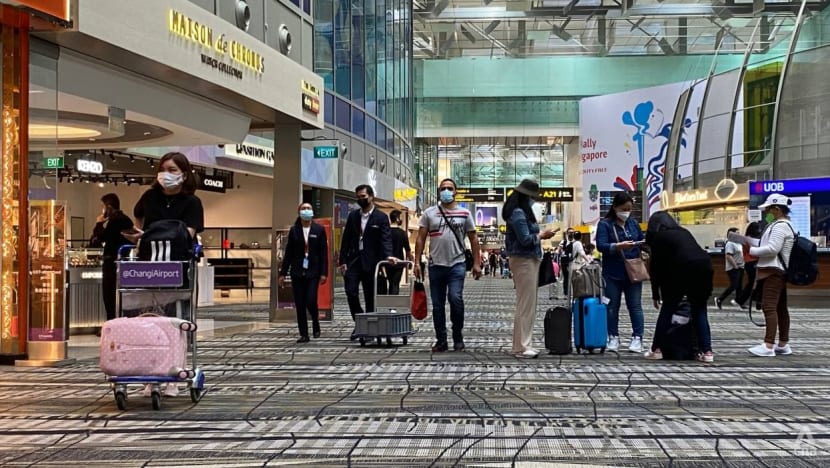MOH closely monitoring global COVID-19 situation, ready to step up border health measures if needed
Singapore will take a cautious approach towards increasing seat capacity as air travel with China is progressively restored, says MOH.

Travellers at the Changi Airport Terminal 3 departure hall on Mar 30, 2022. (Photo: CNA/Grace Yeoh)
SINGAPORE: The Ministry of Health (MOH) said on Friday (Dec 30) that Singapore is ready to step up border health measures if needed and that it is closely watching the global COVID-19 situation.
In a press release, the ministry noted that there has been some public concern about the high level of infections in China and the latest announcements to relax their border measures on Jan 8 next year.
"While many countries had previously fully lifted public health-related border measures, Singapore did not do so and has maintained some measures," said MOH, highlighting measures for non-fully vaccinated individuals entering Singapore.
"These measures reduce the risk of having severely ill imported cases, which can take up our healthcare capacity.
"At this juncture, we will continue to maintain these prevailing vaccination requirements and border measures for non-fully vaccinated travellers."
The ministry added that it is "watching the situation closely", including both "upstream developments" and the loading on Singapore's healthcare system.
"We stand ready to reinstate border health measures for selected countries if warranted by the public health situation," it said.
CONCERNS OVER VARIANTS, HOSPITAL BURDENS
MOH said on Friday that the most important factor at this stage of the COVID-19 pandemic is Singapore's population immunity.
"We cannot completely stop infections, and indeed the virus has continued to circulate in our communities, but we can ensure that infections result in few cases of hospitalisations and severe illnesses," it said.
The ministry highlighted that Singapore's local epidemiological situation has remained stable after the XBB variant wave, with the country being in a "stronger position to live with COVID-19" due to the introduction of paediatric and bivalent vaccines, as well as new facilities to deal with the coronavirus.
However, it also highlighted two specific concerns with the COVID-19 situation worldwide.
The first is the possible emergence of new and more dangerous variants.
MOH said that Singapore has been working with international partners to monitor the variants circulating globally, and also conducts its own genomic surveillance on local and imported cases.
Based on the sequencing results submitted by the Centres for Disease Control of various Chinese cities, the strains circulating in China are known ones, and no new variants with greater transmissibility or severity than previously identified subvariants have been detected, said the ministry.
The second concern is for travellers not to add "significant burden" to Singapore's hospitals.
According to MOH, Singapore's airport sees between 700 and 1,000 arrivals from China daily, or about 1 per cent to 1.5 per cent of total daily arrivals by air. The majority comprise residents and long-term pass holders returning to Singapore.
On a weekly basis, the ministry has detected between 40 and 80 COVID-19 cases from among these travellers. All of them exhibited mild symptoms, except one returning Singaporean who had become severely ill after recent travel to China.
"As air travel with China is progressively restored, we will take a cautious approach towards increasing seat capacity, taking into account the overall public health assessment," said MOH.
Earlier this month, China announced a nationwide loosening of its hardline COVID-19 restrictions that had triggered rare protests in several cities.
The list of new measures issued by the National Health Commission removed current limits on the number of international flights between China and the world, with outbound travel for citizens to be resumed in an “orderly” manner as the country downgrades its treatment of COVID-19.
This marks the latest move by the Chinese government to unwind its strict zero-COVID regime after it abruptly dropped mandatory testing and lockdowns earlier this month.
As of 12pm on Dec 30, Singapore has had a total of 2,201,379 COVID-19 cases and 1,711 deaths.
The seven-day moving average of local cases on Friday stands at 724, with four COVID-19-related patients in the Intensive Care Unit (ICU).
BOOKMARK THIS: Our comprehensive coverage of the COVID-19 pandemic and its developments
Download our app or subscribe to our Telegram channel for the latest updates on the coronavirus pandemic: https://cna.asia/telegram
















